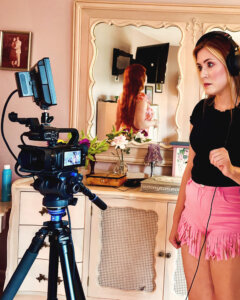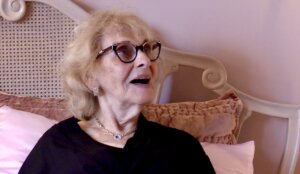This horror movie stars a Jewish grandma from Brooklyn. A sweet little old lady she’s not
A granddaughter’s love and offbeat family history drive the dark and campy film ‘Grandma’s House’

Iris Wachs and Rebecca Cielinski. Photo by Beth Harpaz
When a foot injury sidelined Rebecca Cielinski from her usual pursuits as an actor and dancer, she needed a creative outlet. She decided to make a movie starring her beloved grandma, Iris Wachs.

But this wouldn’t be a tribute to a sweet little old lady. Nope: This would be a horror movie with Grandma as drama queen, mocking her grandchild’s engagement ring. It would evoke the ghost of a grandfather who liked to play favorites. And it would end with an ill-fated slumber party.
The finished film, an 8 1/2-minute short, packs a shocker of a finale revealing Grandma’s true colors — and that’s all I’ll say about that — while giving off a darkly comical vibe.
Grandma’s House has already been accepted to two film festivals, premiering at the Northern Horror Fest in Bergenfield, New Jersey, Friday, July 19, with another screening at Brightside Film Festival — Short Films Fest in Jersey City, New Jersey, Aug. 11. Cielinski hopes to have it shown at more events, eventually get it released on a streaming or internet platform, and use it as a springboard for future projects.
But why choose horror for her first effort as a filmmaker — and for a family story, of all things?
Well, Cielinski is a fan of the genre, and she thinks horror offers more opportunities for strong female characters than traditional family dramas. But horror also seemed like a “more fun way to represent my family,” she said.
After spending an hour with Cielinski and Wachs in the place where Grandma’s House was filmed and hearing some of their unusual family stories, I had to agree.
Sea Gate and Coney Island: Freaky vibes

Cielinski and Wachs live together in Sea Gate, a gated community on the western edge of Coney Island. Wachs, 86, has lived in the house since the 1950s. Cielinski, 32, whose stage name is Rebecca Lauren, moved into a downstairs apartment after college.
Wachs recalled that when her father-in-law moved to Sea Gate in the 1920s, “He saw a sign: ‘No Jews allowed.’” Today, though, lots of Jews live there; Sea Gate even has its own Chabad.
But to New Yorkers who’ve never peeked beyond Sea Gate’s fences and guard booths — an unusual feature in New York City — the neighborhood can seem a bit creepy and mysterious. It’s just a mile and a half from the hubbub of Coney Island’s boardwalk and rides, which have their own freaky vibe. Sea Gate’s quiet, empty streets, with ocean waves pounding the beach and the occasional gull overhead, can feel just as spooky in a different way.
A poison ring and the Parachute Jump

Of course, all that makes the perfect backdrop for family drama, and Wachs is just the right mix of delightful and eccentric to be the film’s dark star. She showed me a ring on her finger with a secret compartment to conceal poison or drugs (“Everybody wants it when I die,” she told me, “but I think I might take it with me”), and described getting stuck at the top of Coney Island’s Parachute Jump on the last ride before it closed forever in 1964.
In the movie, Wachs’ character is bedridden, depressed, popping pills and mourning her husband’s passing. In real life, she speaks of her late husband Lenny — who died last year right before his 97th birthday — with love, longing and a dash of hero worship. He was an athlete who tried out for the Brooklyn Dodgers; he was a pool hustler who’d disappear for days, then come home flush with cash. They called him the king of Coney Island, but he also worked as a bricklayer: “The guys would say they never saw a Jewish laborer before, but he was able to do almost everything,” Wachs said. Later, Iris and Lenny ran a lunch wagon feeding construction workers; then, at age 50, Iris embarked on a 25-year career as a public school teacher.
Scares without the gore

Cielinski said she drew inspiration for Grandma’s House from one of her favorite horror films, The Others, starring Nicole Kidman. She liked “the way they’re in a house and they’re kind of trapped, but there’s not really any gore. It’s just sound effects — like the slamming of doors — that create the horror. And I wanted that for my movie. I didn’t want a bloody scene. I wanted to just visually and with sound create the scare.”
A spooky bell, footsteps and a storm helped set that mood for Cielinski’s film, but she also recorded and included a haunting version of a 1918 song, “I’m Forever Blowing Bubbles,” with a family connection: Wachs once found her own mother singing the song while standing outside, stark naked, banging two garbage can covers together.
“If I’m going to have a crazy grandma in a movie who’s lost it with the loss of her husband and is popping pills, I’m like, ‘What better a way to celebrate family in that weird, bizarre history than to use that song?’” Cielinski said.
Strong female characters

Cielinski says it’s unusual to see grandmothers in a horror movie, “and when you do, it’s usually the grandparents together. But I wanted an interesting dynamic, the strong female characters clashing. I wanted it to be like we’re all pining for Grandma’s love and affection and approval, but within some sort of horror lens.”
The film also plays with the idea that Cielinski’s grandfather liked her better than anyone in the family. “He adored her,” Wachs said. That favoritism adds to the tension in the story between Grandma and her granddaughters, a pair of sisters played by Cielinski and actor Chelsea LeSage.
More importantly, though, Cielinski wanted the grandmother on screen, like her real grandmother, to be “the one in control, the one who runs the house. I didn’t want to be the focus. I wanted her to steal the show.”
Of course, the biggest difference between the movie and real life is that Wachs’ malevolent character does not have her granddaughters’ best interests at heart. In real life, while Wachs said she was initially “floored” by the idea of acting in a horror film, “it didn’t take too much convincing” to get her to do it. Looking at Cielinski, she added: “If it was good for her, it was good for me.”
A message from our Publisher & CEO Rachel Fishman Feddersen

I hope you appreciated this article. Before you go, I’d like to ask you to please support the Forward’s award-winning, nonprofit journalism so that we can be prepared for whatever news 2025 brings.
At a time when other newsrooms are closing or cutting back, the Forward has removed its paywall and invested additional resources to report on the ground from Israel and around the U.S. on the impact of the war, rising antisemitism and polarized discourse.
Readers like you make it all possible. Support our work by becoming a Forward Member and connect with our journalism and your community.
— Rachel Fishman Feddersen, Publisher and CEO




























